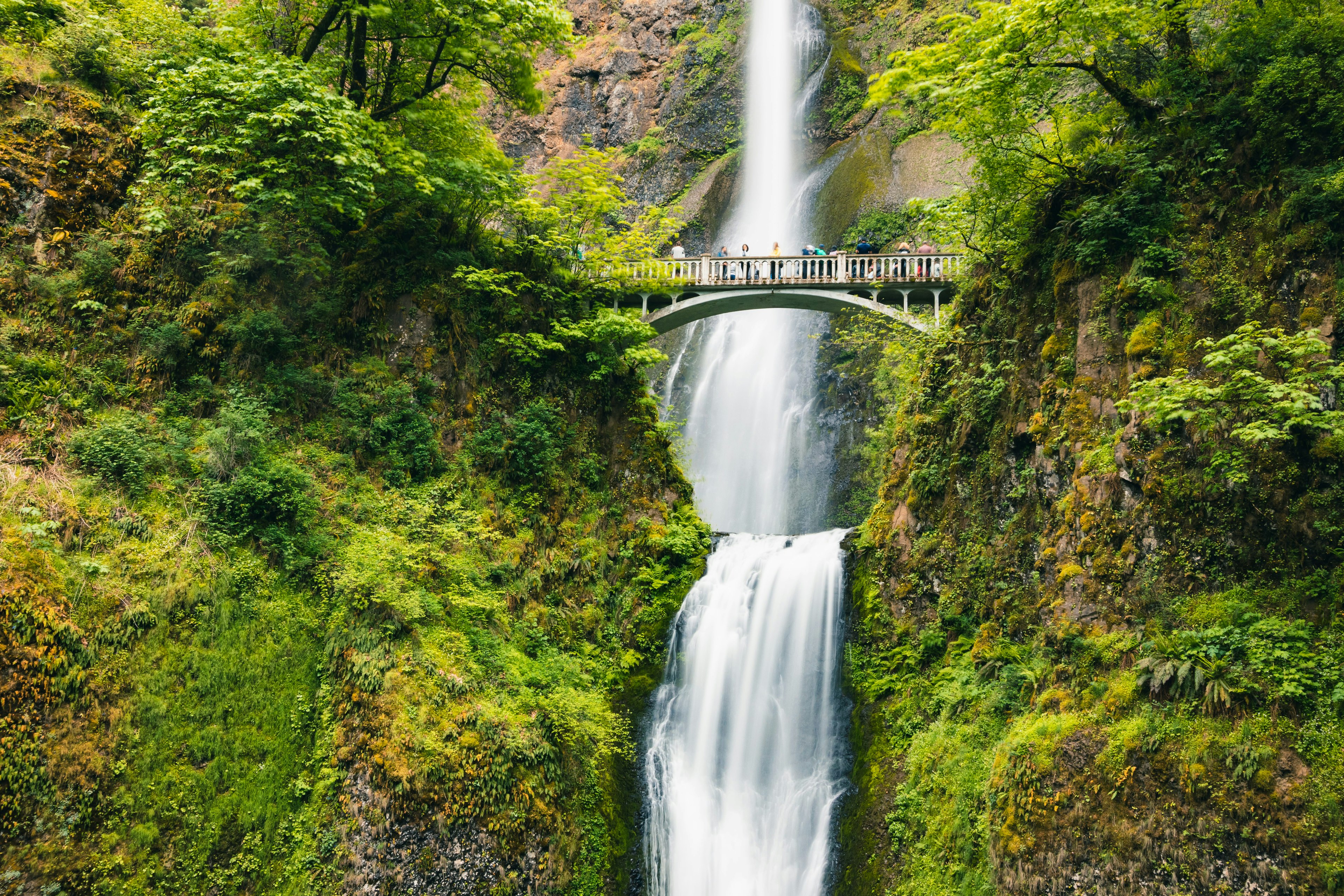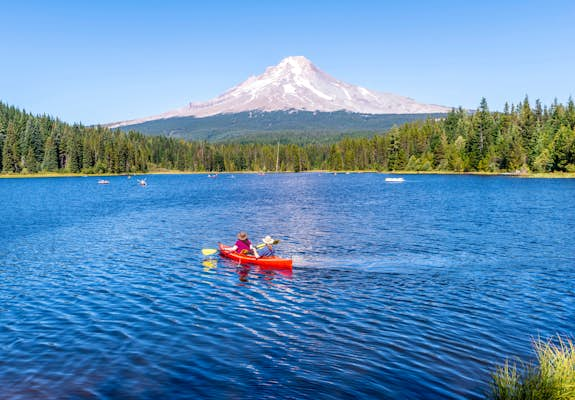As entertaining as Portland can be, its surroundings might be even better. The city is within an hour or two of both the ocean and the mountains, with all the outdoor activities and scenic beauty that entails. People here love spending time outside, although it means different things to different people – stand-up paddleboarding on an alpine lake counts, but so does wine-tasting on a sunny patio.
Whether you crave mountains, valleys, beaches, berries or grapes, there’s a Portland day trip you won’t want to miss. Most of these trips are much easier to do by car but can also be reached by public transport if you have some extra time.

1. Chase waterfalls in the Columbia River Gorge
Travel time: 45 minutes
The Gorge is a little slice of hiker heaven right in Portland’s back yard. Steep, forested walls carved by the Columbia River (and lots of wind) are laced with hiking trails of all kinds, from rugged and grueling to barely-leave-the-parking-lot. The key feature of this terrain is waterfalls, and lots of them. Multnomah Falls is the crown jewel, a double-tiered beauty with a bridge across halfway up. But there are less-famous (and less crowded) falls all along the Gorge. For a sense of scale and epic views, start by visiting Crown Point Vista House or the Portland Women’s Forum Viewpoint, both of which are just off the Historic Columbia River Highway (parallel to I-84). From there, choose a handful of falls to explore; you can reach many from the road, but this is also a great area for day hikes.
Visiting Multnomah Falls requires some planning, as it is Oregon’s most-visited site and often crowded. Visit on a weekday if possible, and plan to arrive early in the morning or after 6pm. From 9am to 6pm Memorial Day through Labor Day (basically late May to September), visitors must have a timed-use permit reserved in advance ($2). There’s also a hefty fee for parking if the main lot is full.
How to get to the Gorge from Portland: Take I-84 east toward Corbett, where you exit for the Historic Columbia River Highway, a winding, narrow road that lets you stop at any number of waterfall trailheads as well as Crown Point Vista House. Traffic can get clogged up on weekends and around Multnomah Falls, and parts of the road may be closed for construction. Many of the falls are also accessible from I-84, a more direct but less scenic route. The main parking lot for Multnomah Falls is at Exit 31 off I-84; gates will close if the lot is full.
Alternatively, the Columbia Gorge Express runs daily from Gateway Transit Center in Portland to Multnomah Falls and the fun town of Hood River. And there are several companies offering tours of the Gorge.

2. Sample local pinot in the Willamette Valley
Travel time: 1 hour
Though it might not yet be as well-recognized as Napa, the Willamette Valley excels at producing complex pinot noirs. The fertile area surrounding the Willamette River stretches from just south of Portland to Eugene, and the northern part of it makes a delightful and easy trip from Portland.
Start by checking out the small towns of Dayton, Dundee, and McMinnville, wine-tourism hubs with several tasting rooms you can walk among. For more exploring, venture out to the countryside by car or bicycle to visit wineries strewn along scenic backroads. These range from exclusive to very approachable, and often the settings are as appealing as the wines. Most are family-owned and welcoming to newbies and serious oenophiles alike; some serve food, others welcome picnickers. Local delights also include country markets, hazelnut farms, distilleries, cheese factories, bike trails (and winery tours by bike) and some truly luxurious bed-and-breakfasts, in case a day trip isn’t enough.
How to get to the Willamette Valley from Portland: The north Willamette Valley is about 40 miles from Portland along OR-99W. Signs along the highway direct you to various tasting rooms and vineyards. Or you can take the MAX light-rail to Hillsboro, then transfer to a Yamhill County Transit bus to McMinnville (about 2 hours total), where tasting rooms are accessible on foot. The bus also stops in the towns of Yamhill and Carlton.

3. Pick your own blueberries on Sauvie Island
Travel time: 25 minutes
Sauvie Island is a Manhattan-size island at the confluence of the Willamette and Columbia Rivers. It’s known as a great place for birdwatching and bicycling, but its main claim to fame is all the fertile farmland, which makes it a local destination for berry picking and shopping for produce. Oregon berries are legendary, and gathering them yourself on a U-pick farm makes them even tastier. There are also corn mazes and pumpkin patches, hayrides, harvest festivals, alfresco concerts, and farm-to-table dinners – check out Topaz Farm or The Pumpkin Patch for all of the above.
Kayakers can paddle around shallow Sturgeon Lake, in the middle of the island. And hiking trails abound, like the Oak Island Nature Trail.
How to get to Sauvie Island from Portland: Follow US-30 about 15 miles northwest to the Wapato / Sauvie Island Bridge. From here, Sauvie Island Rd makes a loop around the island. Parking in most places on the island requires a $10 pass, which you can get at the Cracker Barrel store near the bridge or online through Oregon Department of Fish and Wildlife.
Trimet bus #16 takes you from Portland to the parking lot just over Wapato Bridge; from there the flat paved road is a popular place to bicycle around.

4. Explore tide pools on Cannon Beach
Travel time: 1 ½ hours
The Oregon Coast is truly spectacular, and Cannon Beach is one of the most inviting entry points to it. Alongside a walkable town full of galleries, shops and cute restaurants, you’ll find miles of white sandy beaches and cool rock formations to explore. (You’ve probably seen photos of Haystack Rock, looking lovely as the foreground to an Instagram sunset.) At low tide, you can get lost for hours exploring the underwater worlds hidden in tide pools along this stretch of coastline: look for bright orange and purple sea stars, green anemones, mussels and barnacles, hermit crabs and more. (Just remember to take only photos, and don’t touch anything living in the pools.)
How to get to Cannon Beach from Portland: Take Hwy 26 west from Portland for about 75 miles, then drive south on Hwy 101 following signs for Cannon Beach.
Oregon POINT buses run daily between Portland and the coast, including Cannon Beach (about 2 hours one-way). Tickets are purchased through Amtrak, either online or at Portland’s Union Station.
5. Get a postcard view of Mt Hood from Trillium Lake
Travel time: 1 ½ hours
This popular mountain getaway offers stunning vistas of Mt Hood reflected in the lake’s shimmering waters, a busy campground, and boardwalk trails through wildflowers in season. During the spring and summer, the lake is open for paddling and fishing. The 63-acre lake sits at an elevation of 3,600 feet, though, so by late October or early November the access road is closed by the park service, and instead transforms into a cross-country ski and snowshoe trail for the winter. An Oregon Sno-Park permit is required November 1 through April 30 (available at sporting goods stores).
How to get to Trillium Lake from Portland: US-26 East will get you to Trillium Lake in about an hour and a half. Just past the town of Government Camp, look for signs to forest service road NF-2656 to reach the Trillium Lake campground and day-use area. For non-campers, there’s a $10 day-use fee payable on-site (free with a NW Forest Pass).

